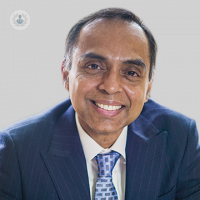What are the complications of diabetes if badly managed?
Escrito por:Type two diabetes is a major health problem in the world and increasingly in the UK. You may wonder why high blood sugar is a problem and what danger it poses. The answer is that it can cause a number of symptoms and complications. We talked to top endocrinologist Dr Sandip Ghosh, who explained why you have to manage diabetes and what other conditions it can cause.

Why do you have to manage high blood sugar?
We manage high blood sugar for several reasons:
- Symptoms: high blood sugar can lead to symptoms like feeling very tired, very lethargic, having no energy at all, going to the toilet frequently and feeling thirsty all the time. In addition, quite a common symptom would be to develop thrush, which manifests as itchiness and soreness in the genital area. However, blood sugar levels have to be very high to have these symptoms. High blood sugar can often be asymptomatic – that means you do not display any symptoms.
- Organ damage: We know from large clinical trials that some people can have diabetes without knowing they have it for up to ten to twelve years, and what happens to these people is that the undetected high blood sugar levels go on causing damage to the different organs of the body. That’s why it’s important to treat diabetes to reduce the risk of complications.
- Complications of diabetes can be expensive: It’s not the early stages of diabetes or diabetes medications that are expensive, but it’s the management of the complications caused by diabetes that’s very challenging, not only to the health of the individual who’s suffering these complications, but also in terms of the money spent on treating them. We know that a huge amount of money is spent each year on diabetes care and that the majority of this is dedicated to treating complications of diabetes, rather than the early stages of the disease.
What conditions can diabetes lead to if badly managed?
There are the three main areas which diabetes can affect:
- The eyes – for example, diabetic retinopathy.
- The kidneys – for example, diabetic nephropathy
- The feet – in particular, it damages the nerves in the feet, causing numbness, among other things.
Of course, there are other possible effects:
- It can affect your heart – high blood sugar is a major risk factor for developing heart problems.
- It can affect the brain through the circulation.
- It increases the likelihood of suffering a stroke.
Whereas the first three complications are mainly due to diabetes alone, the latter complications can be compounded by the fact that people have made lifestyles choices like smoking and not doing enough exercise. Therefore, lifestyle intervention is an important cornerstone for the management of diabetes and reducing the risk of long term complications.


